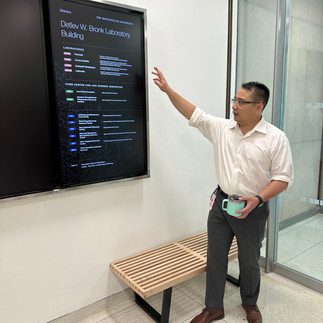A Look Inside: The New Ford Center Incubator at The Rockefeller University
- NYC RIN

- Sep 10, 2024
- 2 min read
If you’ve spent time on the Upper East Side of New York City, you’ve probably strolled past The Rockefeller University—even if you didn’t know it was there. Tucked away behind a high gate and security post, the leafy campus hiding in plain sight is at times mistaken for something other than a university. First founded in 1901 as the Rockefeller Institute for Medical Research, it is the oldest biomedical research institution in the U.S. It’s also now home to the Ford Center for Life Science Innovation, which includes the newly established Ford Center Incubator, which opened its doors in March 2024.
Among the features that set Ford apart is the history of the space and even some of the equipment currently in use, a reminder of scientific process and progress, and an inspiration for all who work there. The incubator’s fourth floor home was once the site of Ralph Steinman’s lab; the Nobel Laureate who identified the cell type that is almost singularly responsible for commanding the efforts of all other immune cells: the dendritic cell. Elsewhere on the fourth floor is equipment formerly used by the lab of Nobel laureate Paul Greengard, known for his work on the molecular and cellular function of neurons. Additionally, the incubator has ultra-low temperature storage units once used by Mary Jeanne Kreek, who pioneered groundbreaking work on understanding the physiological impulse to addiction that became the foundational science behind methadone clinics.
With 50 desks for as many 15 companies, the incubator is currently home to its first tenant, with several more expected to move in before the end of the year, according to. Dr. Carlo Yuvienco, the inaugural Director of the Ford Center Incubator. The 8,000 square foot floor includes coworking and private lab space, the latter including Gigabit Ethernet, vacuum and lab air, cryogenic storage, three chemical fume hoods, an autoclave, two shared access tissue culture rooms, and numerous other flexible lab options. The Ford Center Incubator can draw upon the resources of the larger Rockefeller University, including a full-service vivarium and flow cytometry facilities, and also partner with other institutions as needed to access other lab technology. . The facility’s critical equipment is supported by multiple backup systems, including a nearby backup power plant that serves the University.
The flexible layout and available resources of the incubator were clearly designed with the entrepreneurial scientists in mind, with input from Yuvienco, who developed his sensibility and vision for the needs and work of potential tenants during his time with the NYC Economic Development Corporation. As he describes it, the incubator’s “hypothesis” is that the neighborhood, with its concentration of biomedical institutions and research, will both benefit from and support a local incubator targeting high-impact biomedical research and early-stage commercialization.
To learn more about the Ford Center Incubator, visit their website at https://fci.rockefeller.edu/
















Comments